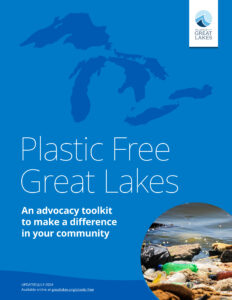Plastic Free Great Lakes Toolkit
An advocacy toolkit to make a difference in your community
We all love and depend on clean water. Unfortunately, plastic is polluting our waterways — in the Great Lakes and around the world.
Researchers estimate that over 22 million pounds of plastic enter the Great Lakes every year. And plastic never really goes away. Instead, it just breaks down into smaller and smaller pieces known as “microplastics.”
Researchers have found stunningly high amounts of tiny plastic pieces in all five Great Lakes, which provide drinking water for 40 million people. They’ve found microplastics in Great Lakes fish, drinking water, bottled water, and beer.
These plastics are making their way into human bodies. A growing body of research is identifying the health impacts and costs caused by plastic.
Plastic within the Great Lakes ecosystem also has a large impact on wildlife. A University of Toronto study found that 90% of Great Lakes water samples taken from the last 10 years contain microplastic levels that are “unsafe for wildlife.”
Plastic pollution is a large and systemic problem, but the good news is we have solutions. Now you can find those solutions – and learn how to advocate for them – all in one place. Fight back against plastic pollution with our Plastic Free Great Lakes Toolkit.
Your Blueprint for Fighting Plastic Pollution
In the Plastic Free Great Lakes Toolkit, you’ll learn more about where plastic pollution comes from. You’ll learn about solutions, including policies that are already working. And you’ll get tools and resources to help you drive change in your community.
You can download the entire toolkit or download each resource separately:
Tools for Building Public Support
Tools for Communicating with Decision Makers
- Writing a Letter to an Elected Official
- Petitions 101
- Tips for Talking with Decision Makers: In-Person and Over the Phone
- Speaking in a Public Forum

